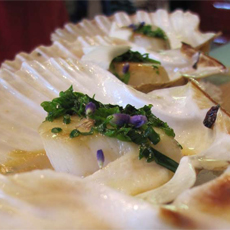




| Home | Features | Club Nights | Underwater Pics | Feedback | Non-Celebrity Diver | Events | 8 August 2025 |
| Blog | Archive | Medical FAQs | Competitions | Travel Offers | The Crew | Contact Us | MDC | LDC |

|

|
 
 |
 |
ISSUE 8 ARCHIVE - COOKING THE CATCHAndrew MaxwellScallops Roasted in their Shells with Wild FlowersMy word how time flies. It was only a couple of weeks ago that the latest edition of London Diver landed on my doorstep and already I am being hounded by the editors for the next copy!There are two topics up for discussion in this issue. Firstly, the book I have just been handed, called "The Axis of Evil Cookbook". It is a collection of traditional recipes from Iraq, Iran, North Korea, Cuba, Libya and Syria. (Clearly the author was either too chicken to put Afghanistan in there, for fear of reaction by the Taliban, or actually is a Taliban himself). The front cover is adorned with a picture of the world's most STUPID man and ex- American President. |
 |
|
It would seem obvious that this
edition of London Diver should
contain a recipe from the book in
question. However, flicking through
the pages, it has quickly become
obvious that there is something
distinctly lacking from an 'Axis of
Evil' diet.
Fish. There is not a single recipe in the book that includes any form of fish – even the Cuban recipes, which for an island, merely serves to prove my point. Clearly, the lack of fish in a diet makes you evil and will render you to an uncomfortably hot afterlife. I did however, find a rather interesting looking recipe for Iranian Donbalaan (or 'sheep's testicles'): You will need:
|
||
|
Clean the testicles. Cut in two and
remove the skin. Put the eggs in a
bowl, mix and season. Next, dip
your testicles in the egg and then in
the breadcrumbs. Shallow fry until
golden brown and sprinkle with
parsley.
Delish! Now, on to the second topic, and a tad more serious. I am sure that the vast majority of you will have heard about the new documentary that has been gracing cinemas around the world, called "The End of the Line". "The End of the Line" follows in the footsteps of former US President candidate, Al Gore's, documentary, "An Inconvenient Truth". This film paints a frightening picture of what our world would be like without fish and just how close we are to achieving that. It is a MUST SEE. The film has played a major role in the French President Nicholas Sarkozy's decision to support a ban on the international blue-fin tuna trade. The UK is expected to follow suit and the US is also under pressure to support a ban. Interestingly, one of the world's most famous Japanese restaurants (who shall remain nameless, but who have no less than three 'places to be seen' in London) have announced that they will NOT be removing blue fin tuna from their menus, but that they do actively discourage customers from buying it. How considerate of them! In keeping with the theme of Cooking the Catch, I ought to also give you a nice seafood recipe. I had dinner recently at the magnificent Launceston Place in Kensington, where executive chef Tristan Welch, a former colleague from my cheffing days, has developed a fantastic way to cook scallops. This recipe is superb, as it is exactly the sort of thing you can do on the back of a boat, when all you have to hand is a small galley with a camping stove. (The wild flowers can easily be substituted with seaweed). |
 | |
Scallops Roasted in their Shells with Wild FlowersServes four as a starter.
To cook the scallops you will need a hot pan that will fit at least three of the scallops at one time. Scallops cook quickly and to overcook them will result in a very tough and dry scallop. This dish only takes five minutes to cook, so you have to be quick. Heat a non-stick frying pan until hot. Take the scallops and dust them lightly with sea salt. Put a dessert spoon of olive oil in the pan and place the scallops in the pan with the shell facing up and the scallop meat in contact with the pan's surface. When you cook it this way, you not only brown the scallop but the shell also keeps all the moisture from the scallop and starts to steam it. It gives the scallop a good, even all-round cooking. When the scallop is nice and brown on top of the meat, add a piece of the butter and remove the pan from the heat. Take out the scallops and place them meat side up on a tray. Place the pan back on the heat and add some of the white wine (not all of it if you are cooking the scallops in batches). Let the wine reduce by half, then add some of the vegetable stock (again not all of it if you are cooking it in batches). Stir well and pour the sauce into a small sauce pan and keep it to one side for the moment. Repeat this until you have all the scallops on the tray then pop them all in the oven for 3 minutes. While the scallops are in the oven warm up the sauce and taste it to check the level of salt and acidity. Adjust to taste. To serve, place the scallops on a bed of sea salt to keep them steady, divide the sauce between the 12 scallops, dress the flowers in a little olive oil, place on top of the scallops and serve. |
 | |
Previous article « Dos and Don'ts of Sharm Dayboating Next article » Non-Celebrity Diver Back to Issue 8 Index | ||